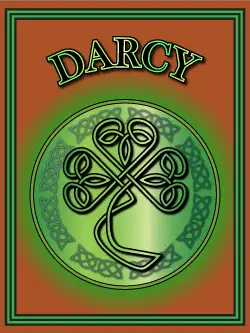The name Darcy is a popular one around the world as both as a surname or a given name for a boy or a girl.
It has both an Irish and a French origin, with two similar names emerging independently of each other. In the 17th and 18th centuries, the two would have merged together to form Darcy, the name we know today. A few variations can still be found, such as Darcey, d’Arcy and Dorsey.
The Irish version of the name comes from the ancient Gaelic name ‘O’Dorchaide’. This meant the son of the dark one. The ‘O’ prefix was common in Irish names. It meant ‘the grandson of’ or ‘the descendent of’. Dorchaide meant ‘the dark one’.
Prior to the Norman invasions of the 12th century, Ireland was split into numerous mini-kingdoms ruled by family clans. These clans would take their name from their leader. At some point, one clan leader was given the name Dorchaide, the dark one, probably because of his physical appearance.
His clan would have then taken that name, and as he passed the leadership down to his sons, the name had the ‘O’ prefix added. So the O’Dorchaide clan were the son and further descendants of the dark one.
Norman d’Arcy travels to England
The French version of Darcy can be traced back to the Normans. Leaders took their names from the region they were from or where they owned land. People of the village of Arcy in La Manche, northern France would be known as d’Arcy, meaning from Arcy.
The name was brought to England when William the Conqueror led the Norman invasion in 1066. They took over England and the land was given to Norman settlers. One soldier named William de Arecai was given a large territory in middle-England.
The Norman settlers began to integrate themselves into English communities, and over time the name was anglicised into Darcy.
Anglo-Normans invade Ireland
The Anglo-Normans then invaded Ireland at the request of Dermot MacMurrough who had been ousted from his position as King of Leinster by the new High King Rory O’Connor. MacMurrough wanted help getting his territory back, and travelled to England to recruit Norman soldiers, one of whom was the Earl of Pembroke, known as Strongbow.
This triggered an influx of invasions from Britain, as King Henry II became nervous that Strongbow would become a powerful figure in Ireland and try to invade England. Thousands more soldiers were sent to Ireland, and many ended up staying.
During this period, the Anglo-Norman version Darcy became common in Ireland.
The invasion of Oliver Cromwell in the 17th century gave Britain a firm hold over Ireland. The English started taking written records of people’s names so that they could tax them, most versions were spelt Darcy or Darcey.
The name has become popular around the world. It travelled from Ireland to America, Australia and Canada in the years following the ‘Great Famine’, when more than a million people emigrated.
Emigration from France and England over the years has also spread the name throughout the world.
Famous Darcys throughout history
There have been several notable people named Darcy that have excelled in their given fields.

Patrick D’Arcy was an Irish lawyer and politician who campaigned for independence. He is famous for his speech in a 1941 argument with William Molyneux when he stated that “no parliament but an Irish one can properly legislate for Ireland”.
Darcy’s Law is a complex scientific formula relating to how fast liquid will pass through a permeable solid structure such as a bottle full of sand or cotton wool. The law is named after French engineer Henry Darcy who came up with the formula.
Darcey Bussell is a retired English ballet dancer. She is now a judge on the BBC talent show Strictly Come Dancing.
Fitzwilliam Darcy is the name of the wealthy landowner who falls in love with a woman below his social class in the Jane Austen novel Pride and Prejudice. The character was made famous by Colin Firth in the 1995 BBC television adaptation of the novel.
Emma Darcy was the pen-name used by Australian husband and wife writing team Frank and Wendy Brennan. The couple wrote more than 45 romance novels under the name.
